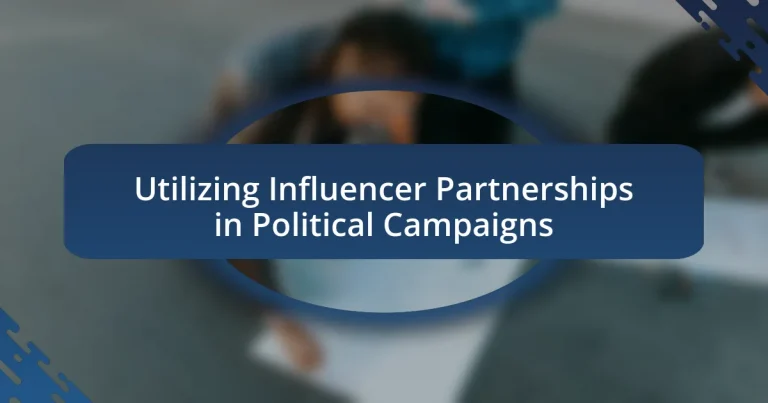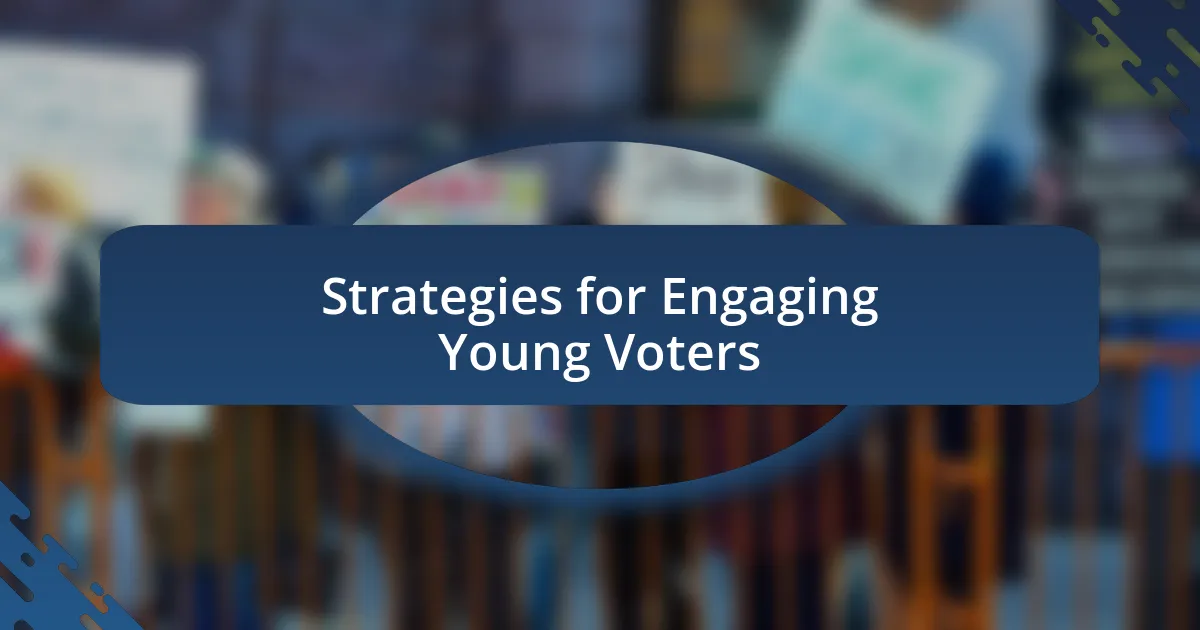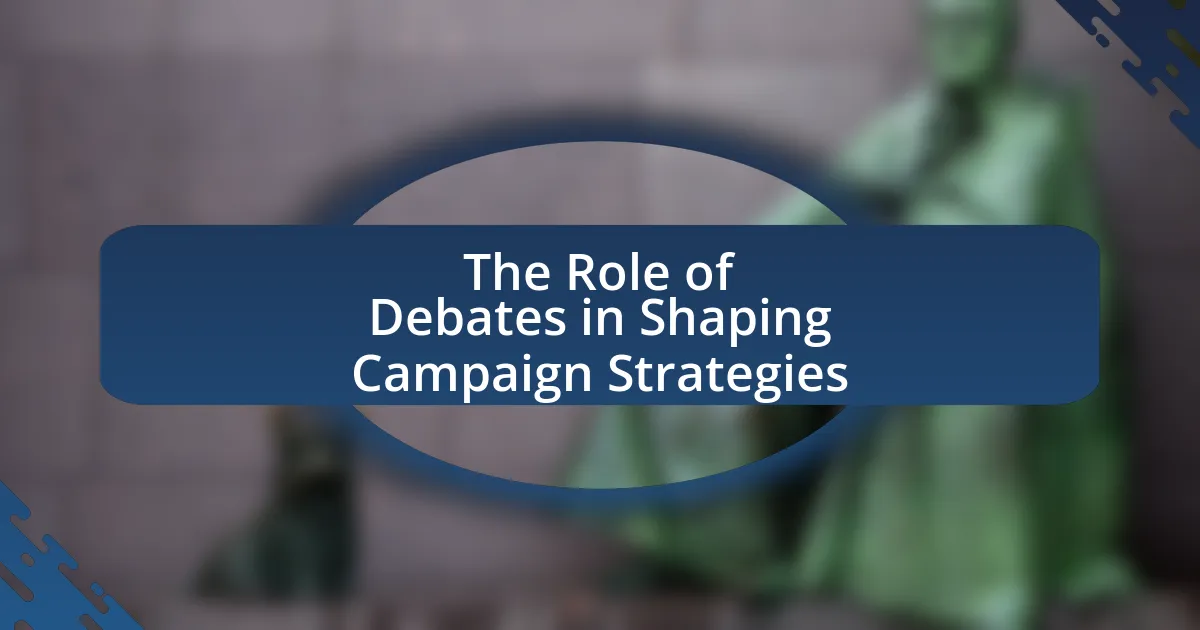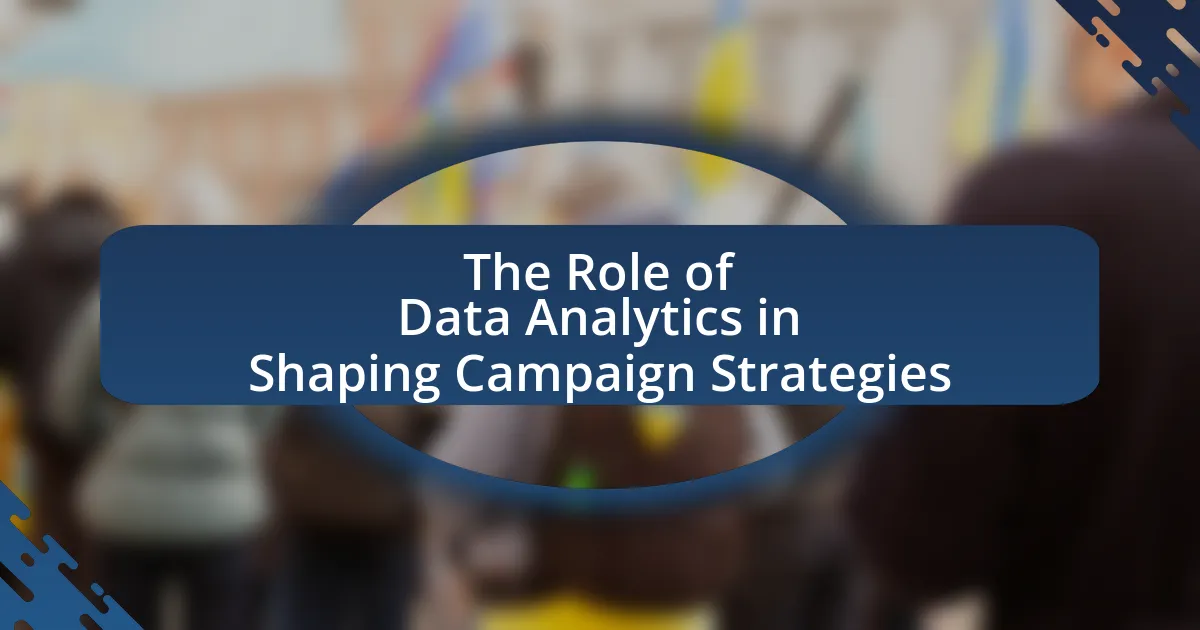Influencer partnerships in political campaigns involve collaborations between political candidates or organizations and social media influencers to enhance voter engagement and campaign visibility. These partnerships leverage influencers’ established credibility and reach to effectively target specific demographics, particularly younger voters, as seen in recent elections. The article explores the functioning of these partnerships, the roles influencers play in shaping political narratives, strategies for effective collaboration, and the challenges campaigns face, including authenticity concerns and regulatory compliance. Additionally, it outlines best practices for selecting and evaluating influencers, measuring partnership effectiveness, and mitigating potential risks associated with influencer associations.
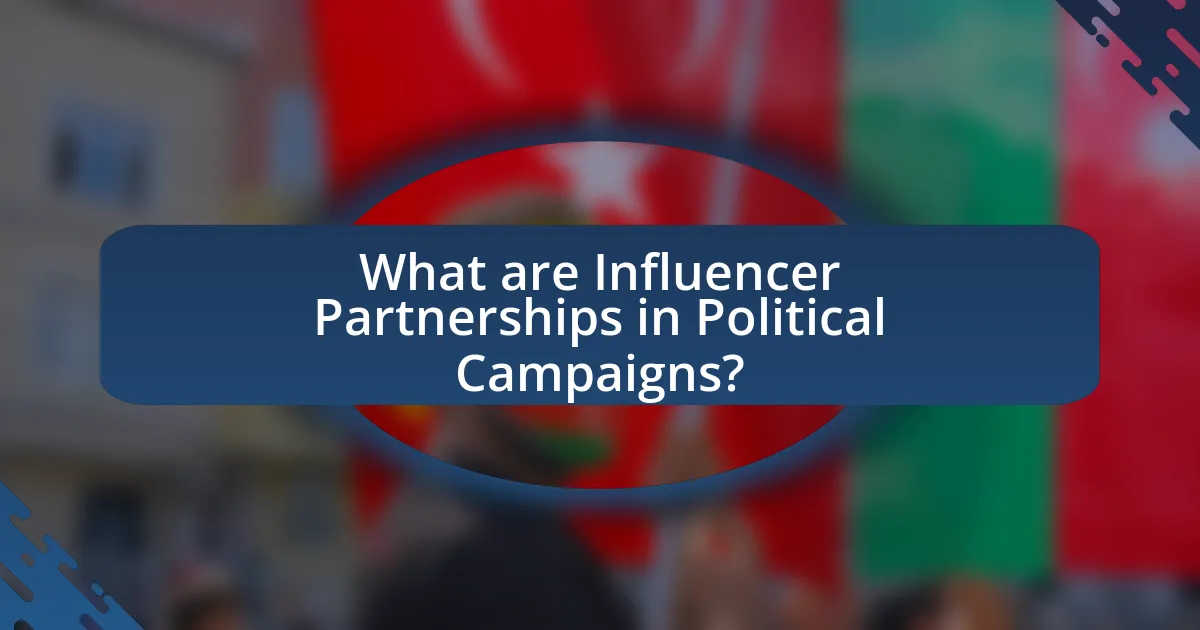
What are Influencer Partnerships in Political Campaigns?
Influencer partnerships in political campaigns refer to collaborations between political candidates or organizations and social media influencers to promote political messages, engage voters, and increase campaign visibility. These partnerships leverage the influencers’ established audiences and credibility to reach specific demographics effectively. For instance, during the 2020 U.S. presidential election, candidates utilized influencers to mobilize younger voters, with platforms like Instagram and TikTok becoming key channels for outreach. Research indicates that influencer marketing can significantly enhance voter engagement, as influencers often have a more personal connection with their followers compared to traditional media outlets.
How do Influencer Partnerships function within political contexts?
Influencer partnerships in political contexts function by leveraging the reach and credibility of social media influencers to engage and mobilize voters. Political campaigns collaborate with influencers to create authentic content that resonates with specific demographics, thereby enhancing voter outreach and engagement. For instance, during the 2020 U.S. presidential election, campaigns utilized influencers to promote key messages and encourage voter registration, resulting in increased participation among younger voters. Research indicates that influencer marketing can significantly impact public opinion and voter behavior, as seen in studies showing that 70% of young voters are influenced by social media personalities when making political decisions.
What roles do influencers play in shaping political narratives?
Influencers play a significant role in shaping political narratives by leveraging their platforms to disseminate information, mobilize audiences, and frame political discourse. They often act as intermediaries between political entities and the public, using their reach to amplify messages and influence perceptions. For instance, during the 2020 U.S. presidential election, influencers on platforms like Instagram and TikTok engaged younger voters, contributing to increased voter turnout among that demographic. Research indicates that 50% of Gen Z voters reported being influenced by social media content when deciding to vote, highlighting the effectiveness of influencers in shaping political engagement and narratives.
How do influencers engage with their audiences during campaigns?
Influencers engage with their audiences during campaigns primarily through authentic content creation and interactive communication. They create relatable posts, stories, and videos that resonate with their followers, often sharing personal experiences or opinions related to the campaign’s message. This approach fosters a sense of community and encourages audience participation. For instance, influencers may host live Q&A sessions, polls, or challenges that invite their followers to engage directly, thereby increasing interaction and investment in the campaign. Research indicates that 70% of millennials are influenced by the recommendations of their peers, highlighting the effectiveness of influencer engagement strategies in reaching and mobilizing audiences during political campaigns.
Why are Influencer Partnerships becoming essential in modern political campaigns?
Influencer partnerships are becoming essential in modern political campaigns because they effectively reach and engage younger demographics who are increasingly disenchanted with traditional media. Research indicates that 70% of teenagers trust influencers more than traditional celebrities, making influencers a powerful tool for shaping public opinion and mobilizing voters. Additionally, influencers can create authentic connections with their audiences, which enhances the credibility of political messages and fosters community engagement. This trend is supported by the fact that campaigns leveraging influencer marketing have seen a significant increase in voter turnout, particularly among millennials and Gen Z, who are more likely to respond to relatable and personalized content.
What advantages do influencers provide over traditional campaign methods?
Influencers provide greater engagement and authenticity compared to traditional campaign methods. Their established trust with audiences leads to higher conversion rates; for instance, studies show that influencer marketing can yield up to 11 times higher ROI than traditional advertising. Additionally, influencers can target niche demographics effectively, allowing campaigns to reach specific voter segments that traditional methods may overlook. This targeted approach enhances message relevance and resonance, ultimately driving more impactful political engagement.
How do influencers enhance voter engagement and outreach?
Influencers enhance voter engagement and outreach by leveraging their established trust and reach within specific communities to mobilize and inform potential voters. They create relatable content that resonates with their audience, often simplifying complex political issues and encouraging discussions around civic participation. For instance, a study by the Pew Research Center found that 55% of social media users aged 18-29 reported being influenced by online personalities when it comes to political opinions and voting behavior. This demonstrates that influencers can effectively drive higher voter turnout and awareness by making political content more accessible and engaging for younger demographics.
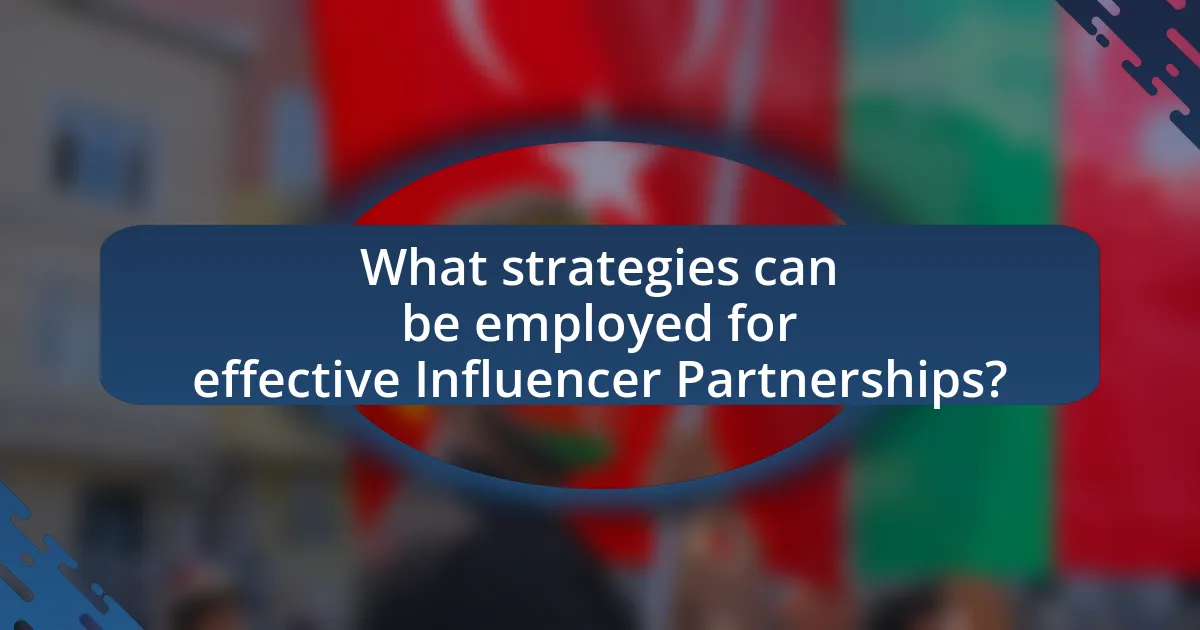
What strategies can be employed for effective Influencer Partnerships?
Effective influencer partnerships can be achieved through targeted selection, clear communication, and measurable goals. Targeted selection involves identifying influencers whose audience aligns with the campaign’s demographic, ensuring relevance and engagement. Clear communication establishes expectations, including content guidelines and timelines, fostering a collaborative environment. Measurable goals, such as specific engagement metrics or conversion rates, allow for the assessment of partnership effectiveness. Research indicates that campaigns utilizing these strategies can see up to a 37% increase in engagement compared to those that do not.
How can political campaigns identify the right influencers?
Political campaigns can identify the right influencers by analyzing their audience demographics, engagement rates, and alignment with campaign values. Campaigns should utilize social media analytics tools to assess the reach and influence of potential partners, ensuring that the influencers’ followers match the target voter base. For instance, a study by the Pew Research Center indicates that influencers with a high engagement rate often have a more authentic connection with their audience, leading to more effective outreach. Additionally, campaigns can evaluate past collaborations and the influencers’ political stances to ensure compatibility with campaign messaging, thereby maximizing the impact of influencer partnerships.
What criteria should be used to evaluate potential influencers?
To evaluate potential influencers, key criteria include audience engagement, relevance to the campaign, authenticity, and reach. Audience engagement measures how actively followers interact with the influencer’s content, which is crucial for effective communication in political campaigns. Relevance ensures that the influencer’s values and messaging align with the campaign’s objectives, enhancing credibility. Authenticity refers to the influencer’s genuine connection with their audience, as studies show that authentic influencers can drive higher trust and engagement rates. Reach quantifies the size of the influencer’s audience, impacting the potential visibility of the campaign. These criteria collectively help identify influencers who can effectively amplify political messages and resonate with target demographics.
How can campaigns assess an influencer’s audience alignment?
Campaigns can assess an influencer’s audience alignment by analyzing demographic data, engagement metrics, and audience interests. Demographic data, such as age, gender, and location, can be obtained through social media analytics tools, which provide insights into whether the influencer’s followers match the campaign’s target audience. Engagement metrics, including likes, shares, and comments, indicate how actively the audience interacts with the influencer’s content, reflecting their interest levels. Additionally, audience interests can be evaluated through surveys or social listening tools that analyze conversations around specific topics, ensuring that the influencer’s content resonates with the campaign’s message. This multi-faceted approach allows campaigns to determine if an influencer’s audience is likely to support their political objectives.
What are the best practices for collaborating with influencers?
The best practices for collaborating with influencers include selecting the right influencers, establishing clear communication, and creating authentic content. Selecting influencers whose values align with the campaign ensures that the partnership resonates with the target audience. Clear communication about expectations, deliverables, and timelines fosters a productive relationship. Authentic content that reflects the influencer’s voice and style enhances engagement and credibility. Research indicates that campaigns utilizing authentic influencer partnerships can achieve up to 11 times higher ROI compared to traditional advertising methods, demonstrating the effectiveness of these practices in political campaigns.
How can campaigns create authentic partnerships with influencers?
Campaigns can create authentic partnerships with influencers by aligning their values and messaging with those of the influencers. This alignment fosters genuine connections, as influencers are more likely to promote campaigns that resonate with their personal beliefs and audience interests. Research indicates that 70% of consumers are more likely to trust a brand when it is endorsed by an influencer they follow, highlighting the importance of authenticity in these partnerships. Additionally, campaigns should engage influencers in the creative process, allowing them to contribute ideas and content that reflect their unique voice, further enhancing the authenticity of the collaboration.
What types of content should influencers produce for political campaigns?
Influencers should produce a variety of content types for political campaigns, including informative videos, engaging social media posts, live Q&A sessions, and personal testimonials. Informative videos can effectively explain political issues and candidates’ positions, while engaging social media posts can spark discussions and encourage followers to participate in the political process. Live Q&A sessions allow influencers to interact directly with their audience, addressing concerns and questions in real-time. Personal testimonials can humanize candidates and create emotional connections with voters. Research indicates that content that resonates emotionally tends to be more shareable and impactful, enhancing voter engagement and awareness.
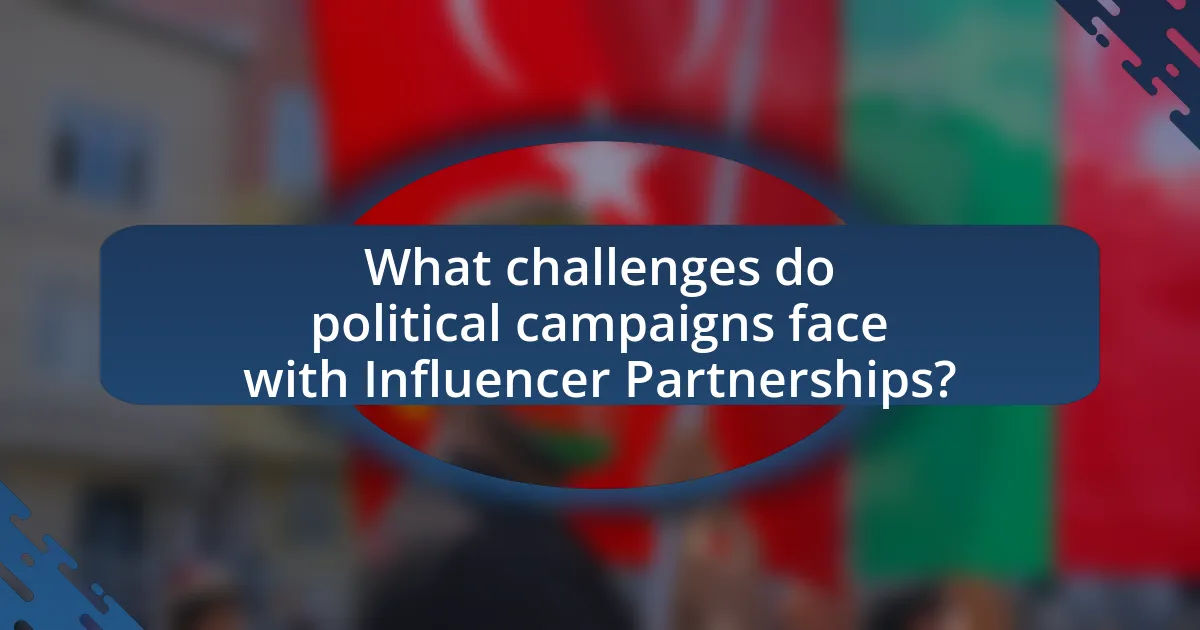
What challenges do political campaigns face with Influencer Partnerships?
Political campaigns face several challenges with influencer partnerships, including authenticity concerns, audience alignment, and regulatory compliance. Authenticity issues arise when influencers may not genuinely support the campaign, leading to skepticism among their followers. Audience alignment is critical, as mismatched demographics between the influencer’s followers and the campaign’s target voters can dilute messaging effectiveness. Additionally, regulatory compliance poses a challenge, as campaigns must navigate disclosure requirements and advertising regulations set by entities like the Federal Election Commission, which can complicate partnerships. These challenges necessitate careful selection and management of influencer relationships to ensure campaign objectives are met effectively.
What risks are associated with influencer collaborations?
Influencer collaborations in political campaigns carry several risks, including reputational damage, misalignment of values, and regulatory compliance issues. Reputational damage can occur if an influencer engages in controversial behavior or makes statements that conflict with the campaign’s message, potentially alienating voters. Misalignment of values arises when the influencer’s beliefs or actions do not resonate with the target audience, leading to a disconnect between the campaign and its supporters. Additionally, regulatory compliance issues can emerge, as political advertising laws require transparency in sponsorships, and failure to disclose paid partnerships can result in legal penalties. These risks highlight the importance of careful selection and management of influencer partnerships in political contexts.
How can campaigns mitigate potential backlash from influencer associations?
Campaigns can mitigate potential backlash from influencer associations by conducting thorough vetting of influencers to ensure alignment with campaign values and audience expectations. This proactive approach helps identify potential red flags, such as past controversies or misalignments in messaging. For instance, a study by the Digital Marketing Institute found that 70% of consumers are more likely to trust brands that partner with influencers who share their values, indicating that alignment can reduce backlash. Additionally, campaigns should establish clear communication guidelines with influencers to ensure consistent messaging and address any issues promptly. By implementing these strategies, campaigns can effectively minimize risks associated with influencer partnerships.
What legal considerations should campaigns be aware of when working with influencers?
Campaigns must be aware of disclosure requirements, intellectual property rights, and contract enforcement when working with influencers. The Federal Trade Commission (FTC) mandates that influencers disclose any material connections to brands, ensuring transparency in advertising. Additionally, campaigns should respect copyright laws regarding content created by influencers, as unauthorized use can lead to legal disputes. Contracts should clearly outline the expectations, deliverables, and compensation to avoid misunderstandings and ensure enforceability. These legal considerations are crucial for maintaining compliance and protecting the interests of both the campaign and the influencer.
How can campaigns measure the effectiveness of Influencer Partnerships?
Campaigns can measure the effectiveness of influencer partnerships through metrics such as engagement rates, reach, conversion rates, and sentiment analysis. Engagement rates, which include likes, shares, and comments, indicate how well the audience interacts with the content promoted by the influencer. Reach measures the total number of unique users who see the content, providing insight into the campaign’s visibility. Conversion rates track the number of users who take a desired action, such as signing up for a newsletter or making a donation, directly linked to the influencer’s promotion. Sentiment analysis evaluates the public’s perception of the campaign based on comments and discussions generated by the influencer’s audience. These metrics collectively provide a comprehensive view of the partnership’s impact on campaign goals.
What metrics should be tracked to evaluate influencer impact?
To evaluate influencer impact in political campaigns, key metrics to track include engagement rate, reach, impressions, conversion rate, and sentiment analysis. Engagement rate measures the level of interaction (likes, comments, shares) relative to the audience size, indicating how effectively the influencer connects with their followers. Reach quantifies the total number of unique users who see the content, while impressions count the total views, providing insight into visibility. Conversion rate tracks the percentage of users taking a desired action (e.g., signing up for a newsletter or donating), reflecting the effectiveness of the influencer’s call to action. Sentiment analysis assesses the tone of comments and discussions surrounding the influencer’s content, revealing public perception and emotional response. These metrics collectively provide a comprehensive view of an influencer’s effectiveness in driving engagement and action within a political campaign context.
How can campaigns analyze audience engagement resulting from influencer content?
Campaigns can analyze audience engagement resulting from influencer content by utilizing metrics such as likes, shares, comments, and click-through rates on social media platforms. These metrics provide quantitative data that reflects how the audience interacts with the content. For instance, a study by the Digital Marketing Institute found that posts with influencer endorsements can generate up to 11 times the ROI compared to traditional advertising, indicating higher engagement levels. Additionally, sentiment analysis tools can assess the tone of comments and discussions surrounding the influencer content, offering insights into audience perceptions and emotional responses. By combining these quantitative and qualitative analyses, campaigns can effectively gauge the impact of influencer partnerships on audience engagement.
What are practical tips for leveraging Influencer Partnerships in political campaigns?
To effectively leverage influencer partnerships in political campaigns, identify influencers whose values align with the campaign’s message and target audience. Collaborating with influencers who have a genuine connection to the political issues at hand can enhance credibility and reach. For instance, a study by the Pew Research Center indicates that 70% of young voters trust social media influencers more than traditional politicians, highlighting the importance of authenticity in these partnerships. Additionally, creating engaging content that encourages influencers to share personal stories related to the campaign can foster deeper connections with their followers. Utilizing analytics tools to track engagement and reach can also help in assessing the effectiveness of these partnerships, ensuring that the campaign maximizes its impact.
